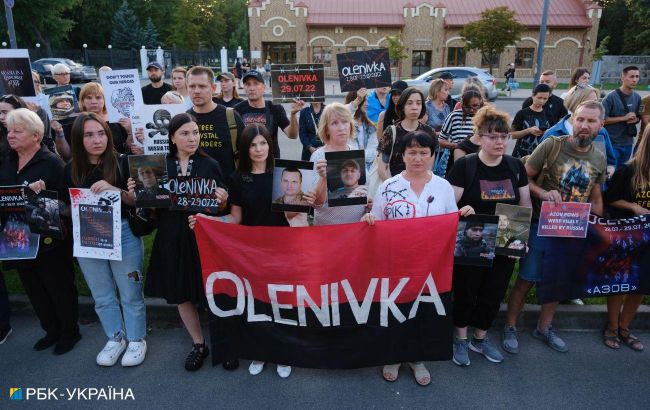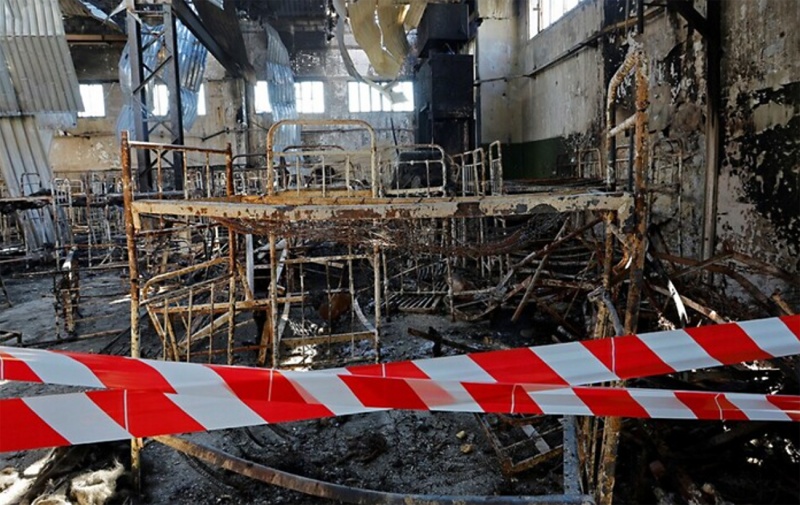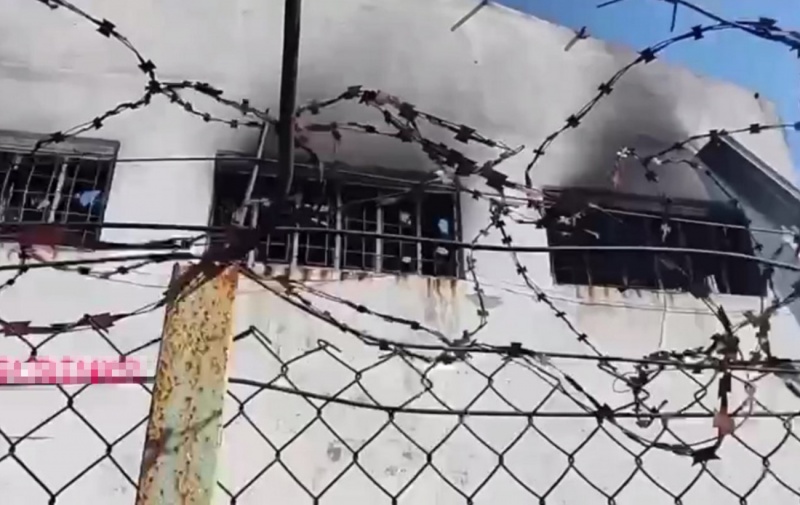Cynical massacre of Ukrainian POWs in Olenivka: Russia's terror attack investigation
 Photo: 2 years after the Russian terrorist attack in Olenivka, no one has been punished for the war crime (Vitalii Nosach, RBC-Ukraine)
Photo: 2 years after the Russian terrorist attack in Olenivka, no one has been punished for the war crime (Vitalii Nosach, RBC-Ukraine)
Two years have passed since the Russian terrorist attack in the colony in occupied Olenivka, Donetsk region. Back then, one of the barracks was destroyed by Russian strikes, killing more than 50 Ukrainian prisoners of war held there and injuring many more. The investigation is still ongoing, as Russia has not allowed either Ukrainian or international investigators to enter the colony.
RBC-Ukraine recalls the Russian cynical killing of prisoners of war, the investigation, and what prevents the identification of the perpetrators among Russian citizens.
Contents
- Chronicle of events
- Russia's terrorist attack
- Suspicions
- Ukrainian prosecutors inclined to believe Russia used thermobaric weapons
- Russia didn't allow UN Commission to investigate
Chronicle of events
In May 2022, the Ministry of Defense of Ukraine announced the launch of an operation to rescue Ukrainian servicemen blocked on the territory of Azovstal. The process took place over 5 days and was supported by security guarantees from the UN, the International Committee of the Red Cross, as well as Türkiye, Switzerland, France, and Israel. From the plant, 53 seriously wounded soldiers were evacuated to a medical facility in occupied Novoazovsk. Another 211 soldiers were transported to occupied Olenivka through the rubber corridor.
Then, on May 21, President Volodymyr Zelenskyy announced that the Mariupol defenders withdrawn from the Azovstal plant blocked by the occupation forces should be released through an exchange procedure.
On the night of July 29, 2022, explosions occurred in one of the barracks of Volnovakha penal colony No. 120, better known as the Olenivka colony, (according to Ukrainian intelligence, the explosions occurred between 10 p.m. on July 28 and 1 a.m. on July 29, 2022). Shortly before that, 193 Ukrainian prisoners of war were transferred to a barracks that had been converted from an industrial hangar to a residential one. According to journalists, the soldiers who were in the main part of the room died immediately. Those in the room next to the barracks were injured. In total, more than 50 Ukrainian prisoners of war from Azovstal were killed in the Russian strike. More than 130 were wounded (according to the Security Service of Ukraine, almost 150). At the same time, Russians cynically did not allow doctors to the site of the attack for several hours, even those who were held in Olenivka.
The exact number of victims and injured as a result of Russia's terrorist attack is still unknown. At the same time, according to the Center for Strategic Communications and Information Security, no prison staff was injured.

Photo: footage of Russian propagandists from the penal colony in Olenivka (Russian media)

Photo: footage of Russian propagandists from the penal colony in Olenivka (Russian media)
Russia's terrorist attack
In the morning, after the attack, the Russian Defense Ministry said that the prison was allegedly attacked by the Ukrainian military with HIMARS missiles. However, the Ukrainian side immediately rejected all accusations, noting that Russia organized the massacre of Ukrainian prisoners to accuse and discredit Ukrainian forces (in particular, to prevent the supply of effective weapons to Ukraine).
The UN report with details and conclusions about the terrorist attack also dispelled the Russians' lies. It noted that the extent of damage to the walls, ceiling, roof, and windows of the barracks, the condition of the bunk beds inside, the size of the crater that remained, and the radius of impact were not typical of HIMARS munitions.
Ukrainian law enforcement is currently conducting a pre-trial investigation under Article 438 of the Criminal Code (violation of the laws and customs of war). In particular, all photos and videos published on the Internet have been comprehensively examined; forensic medical and molecular genetic examinations of the bodies of Ukrainian defenders killed in Olenivka have been conducted; witnesses and injured soldiers who were in the barracks at the time of the explosion are being questioned. In addition, investigative experiments are being conducted with witnesses.
An effective investigation is hampered by Russia, which has so far prevented both the Ukrainian and international parties from accessing the crime scene, explains Taras Semkiv, Deputy Head of the Department for Combating Crimes Committed in the Context of Armed Conflict of the Prosecutor General's Office.
“It was extremely difficult to start an investigation, as such a start should have included an inspection of the scene, obtaining material evidence, and recording all the evidence that remains at the scene in such cases. Unfortunately, investigators and prosecutors did not have such an opportunity,” he says.
Suspicions
The Security Service of Ukraine has served two officials of the Olenivka colony with suspicions of ill-treatment of prisoners of war committed by a group of people.
According to SSU spokesperson Artem Dekhtiarenko, one of them is the former head of the colony, Sergei Yevsiukov. It has been established that from the beginning of the full-scale Russian invasion until the end of July 2023, he organized the torture of more than 100 captured Armed Forces of Ukraine soldiers. The second is his subordinate, Dmytro Neyolov, who directly carried out the orders of his superior. In November 2022, both defendants were “replaced in their positions” by the Russians. They are currently hiding in the temporarily occupied part of the Donetsk region.
The Prosecutor General's Office of Ukraine has also announced its suspicion of the former head of the Olenivka colony and his deputy.
“It concerns the failure to provide medical care to Ukrainian defenders who were injured in the explosion. According to our data, 9 people died as a result of this failure to provide medical care,” Semkiv says.
Ukrainian prosecutors inclined to believe Russia used thermobaric weapons
A representative of the Office of the Prosecutor General of Ukraine says that the Office has little doubt that Russia used a thermobaric munition. However, there are several versions of how it could have been delivered to the barracks. At the moment, the versions are still being checked.
“We already have preliminary conclusions from international experts that this was the result of the use of thermobaric weapons used by Russia itself,” says Ukrainian Prosecutor General Andrii Kostin.
The SSU, in turn, explains that Ukraine had received 59 bodies from Russia, which, according to the Russian side, were killed in Olenivka. However, expert examinations have confirmed that 47 of them died in Olenivka. At the same time, the condition of some of the bodies indicates a very high temperature during the explosion.
The fact that this was a terrorist attack planned by Russians is also evidenced by the fact that a few days before the attack, the Azov regiment was transferred to the very barracks that were at the epicenter of the explosions. The SSU also released an intercepted conversation between so-called Donetsk People's Republic militants in which they suggested that the Russians could have caused the tragedy with explosives placed in the colony.
Satellite images also show that the Russian occupiers had prepared graves for the killed Ukrainian prisoners of war in Olenivka in advance.
Russia didn't allow UN Commission to investigate
On August 3, 2022, UN Secretary-General Antonio Guterres announced the establishment of a mission to establish the facts of the tragedy in the Olenivka colony, but 5 months later, the UN mission, which had not started its work, was closed. Russia did not allow any international organization to visit the site of the tragedy and did everything to hide the truth. Most of the survivors of the explosion have not yet returned to Ukraine and have not received proper medical care and rehabilitation.
At the same time, on October 4, the Office of the United Nations High Commissioner for Human Rights published a semi-annual report on human rights in Ukraine, in which it pointed to the torture to which the Russian military subjected Ukrainian prisoners of war and noted that the explosions in Olenivka are not typical of HIMARS. The report indicates a point of impact inside the western wall and two possible points of entry through the roof. The exact type of weapon and its place of origin could not be determined, and the damage indicated that the guided munition was traveling in an east-west trajectory.
On the second anniversary of the tragedy, Ukrainian Ombudsman Dmytro Lubinets said that Ukraine demands that the UN mission resume its work as soon as possible or that a new one be established to investigate the Russian attack.
Yesterday, during his evening address, President Volodymyr Zelenskyy emphasized that the Russian terrorist attack in Olenivka was one of the worst crimes committed by Russia. Therefore, Russia must be held accountable for it and will be, because there is no such development in which the killers will go unpunished.
Sources: Security Service of Ukraine spokesperson Artem Dekhtiarenko, UN representatives, Deputy Head of the Department for Combating Crimes Committed in the Context of Armed Conflict of the Prosecutor General's Office Taras Semkiv, Prosecutor General of Ukraine Andrii Kostin, Ombudsman Dmytro Lubinets, Mariupol City Council, Coordination Center for the Treatment of Prisoners of War, and the Center for Strategic Communications and Information Security.

